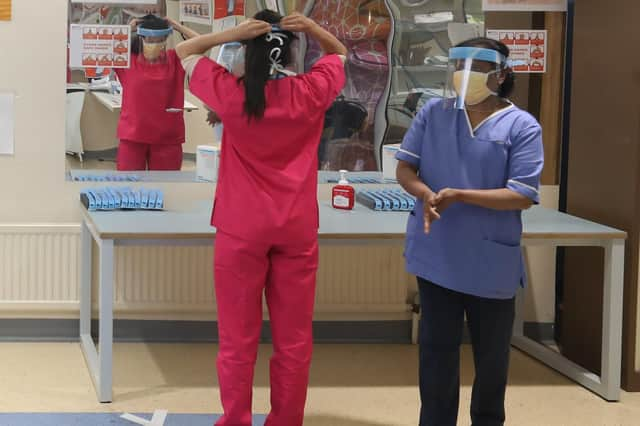£43m worth of Northern Ireland PPE stock from Covid pandemic is at risk of not being used, says report


More than £40 million worth of PPE stock purchased in Northern Ireland during the pandemic is at risk of not being used before its lifespan expires, an Audit Office report has stated.
Northern Ireland's Comptroller and Auditor General, Dorinnia Carville, has published a summary of key findings and issues arising from her audit of central government accounts in 2023.
Advertisement
Hide AdAdvertisement
Hide AdHer report said that, in 2020, during the Covid-19 pandemic, Stormont's Business Services Organisation's Procurement and Logistics Service purchased personal protective equipment (PPE) in "significantly higher volumes than previously required to meet predicted demand".
She stated: "As the impact of the pandemic has receded, the demand for PPE products has reduced.
"Based on average weekly usage rates, potentially £43 million of inventory is at risk of not being used before its current lifespan expires.
"There continues to be uncertainty around future PPE demand and the issue is exacerbated by BSO's contractual commitments to buy more of them."
Advertisement
Hide AdAdvertisement
Hide AdThe Auditor General said that, while BSO has taken steps to mitigate and resolve the issues, she was unable to obtain sufficient and appropriate evidence to establish the success of these actions.
Ms Carville's report said that 2023 saw the production and preparation of central government accounts largely return to their pre-pandemic timetable,.
But she said new financial reporting processes contributed to four central government departments' accounts not meeting the summer recess deadline for certification.
She also found that fraud and error continue to be reported within benefit expenditure across a number of organisations.
These included:
Advertisement
Hide AdAdvertisement
Hide Ad- An estimated £174.1 million in benefit expenditure in the Department for Communities' 2022-23 financial statements.
- An estimated £12.7 million in housing benefit fraud in the Northern Ireland Housing Executive's 2022-23 financial statements.
- An estimated £3.4 million in housing benefit fraud noted in the 2021-22 Land and Property Services' financial statements.
- An estimated £2.5 million in legal aid fraud and error in the 2022-23 Legal Services Agency Northern Ireland's financial statements.
Advertisement
Hide AdAdvertisement
Hide AdThe report notes that, in nearly all of the above cases, estimated levels of fraud and error were lower than in the previous year.
The report also highlighted some delays and deficiencies in the production of accounts, which it attributed to an absence of finance skills, as well as weaknesses in the control systems that protect organisations against potential errors, fraud or financial mismanagement.
Ms Carville said: "I am pleased that the majority of financial statements I have certified during my first year in post have been well-prepared and presented for audit within agreed timetables, with the vast majority receiving an unqualified audit opinion.
"Whilst recognising the unprecedented environment of Covid-19 and the haste in which organisations were required to act to deal with the pandemic, there are important lessons to be learned.
Advertisement
Hide AdAdvertisement
Hide Ad"Furthermore, important issues have been identified which need to be addressed, including required improvement in the internal controls and financial reporting processes across audited bodies, and particularly in the production of timely and well-prepared accounts."
She added: "More generally, though, this report clearly demonstrates the vital role that public audit plays in ensuring financial transparency, good governance and accountability for how public money is spent.
"With the major budgetary pressures facing the public sector now and in the future, appropriate scrutiny and oversight is critically important."